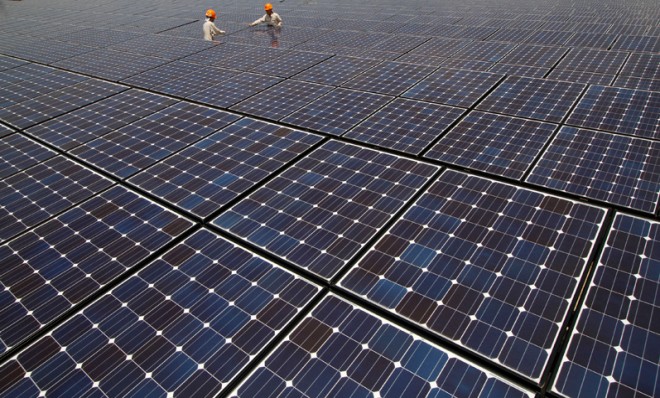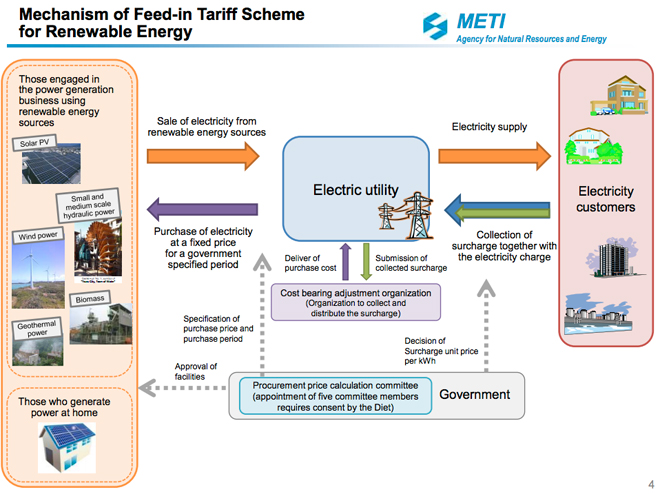Inside Japan's solar boom
Aggressive government demands have made Japan one of the world's most important solar energy markets

A free daily email with the biggest news stories of the day – and the best features from TheWeek.com
You are now subscribed
Your newsletter sign-up was successful
In the wake of 2011's Fukushima nuclear disaster, Japan installed solar panels at such a furious rate that the small nation is quickly becoming the largest solar market in the world, at least in terms of revenue, says researcher IHS.
After years of neglecting renewable energy in favor of atomic power, Japan should have the capacity by year's end to generate 13.5 to 16.8 gigawatts of solar energy — that's the equivalent of five to seven nuclear reactors worth. (For context: One gigawatt is enough to power an estimated 250,000 homes.)
Behind the sudden solar explosion is something called a feed-in tariff, implemented following the earthquake and tsunami that forced the country to shut down its 50 nuclear reactors. Naoto Kan, the prime minister at the time whose ratings were in the gutter due to his perceived lack of leadership, implemented the plan as part of a suicide deal with the opposition party: If they passed a few bills, including the feed-in tariff, he'd resign.
The Week
Escape your echo chamber. Get the facts behind the news, plus analysis from multiple perspectives.

Sign up for The Week's Free Newsletters
From our morning news briefing to a weekly Good News Newsletter, get the best of The Week delivered directly to your inbox.
From our morning news briefing to a weekly Good News Newsletter, get the best of The Week delivered directly to your inbox.
Feed-in tariffs obligate utility companies to buy electricity from a renewable source at a fixed rate — one that's artificially high to spur start-up investment.

Japan's rate is guaranteed over 20 years, and solar has the highest price tag — above wind and geothermal — at 37.8 yen (37.5 cents) to 42 yen per kilowatt hour. The price is twice that of Germany and France.
With solar suddenly in demand (by government fiat), entrepreneurial individuals and companies are installing solar panels by the dozens, says the Washington Post, and utility companies are buying that extra energy to meet their quotas. In a helpful, illustration-heavy booklet, Japan's Agency for Natural Resources and Energy breaks it down like this:
In case of typical household with a 4-kw solar PV panel (that costs about ¥2 million at present) installed, the monthly electricity charge will be reduced from about ¥7,000 to ¥3,660 by using the electricity generated by the solar PV panel for the household. In addition, by selling the excess electricity generated by the panel, the household will be able to earn about ¥9,000. [Agency for Natural Resources and Energy]
In spite of such opportunities, cost remains a big drawback of this forced solar boom. "Renewables are several times pricier than nuclear power or fossil fuels such as coal, oil and gas," says The Washington Post. "The rising use of solar power means energy bills will spike, potentially complicating [the] plan to jump-start Japan's long-foundering economy." (For more on this Abenomics plan, read this.)
A free daily email with the biggest news stories of the day – and the best features from TheWeek.com
Furthermore, explains Japan Today, "free market economists in general do not like feed-in-tariffs because they say these fixed pre-agreed prices distort the play of the electricity markets. Instead of allowing the best electricity provider to be the source, winners are pre-picked — in this case, solar and wind farms." But there's a catch.
What critics do not mention is that the percentage of renewables compared to fossil sources like coal is so small that there is hardly an effect on price movement, and the intent is not to give all future renewable energy generators the feed-in-tariff, but only the first few investors to allow the renewable sector to jumpstart itself. This is somewhat akin to mixing a drop of expensive scotch with a barrel of cheap scotch, then claiming that the price of the blended scotch has risen significantly. [Japan Today]
Carmel Lobello is the business editor at TheWeek.com. Previously, she was an editor at DeathandTaxesMag.com.
-
 Political cartoons for February 16
Political cartoons for February 16Cartoons Monday’s political cartoons include President's Day, a valentine from the Epstein files, and more
-
 Regent Hong Kong: a tranquil haven with a prime waterfront spot
Regent Hong Kong: a tranquil haven with a prime waterfront spotThe Week Recommends The trendy hotel recently underwent an extensive two-year revamp
-
 The problem with diagnosing profound autism
The problem with diagnosing profound autismThe Explainer Experts are reconsidering the idea of autism as a spectrum, which could impact diagnoses and policy making for the condition